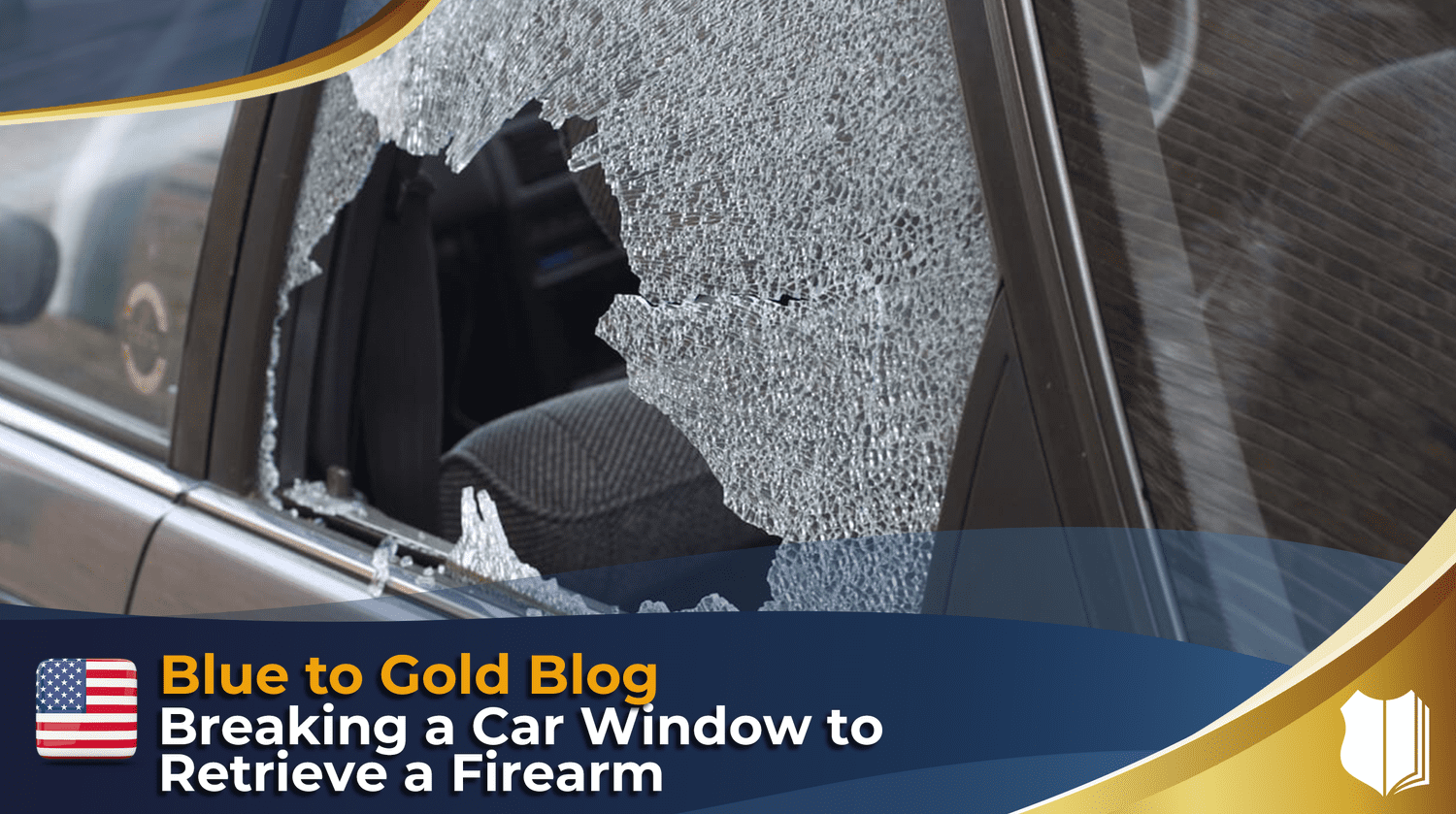This one is a good one. It comes from an officer from Southern California. The question is, “Can cops break a car window to retrieve a firearm that is evidence?”
Let me give you the background here. This was a computer call for service. The victim says that she was assaulted with a gun. The suspect pointed the gun at her. He didn’t shoot her, but pointed it at her. We obviously have assault with a deadly weapon. The victim knows the suspect, knows where the person likely lives, and gives an accurate description of the vehicle, including plate number and so forth.
The deputies arrive at that address and they see the vehicle parked on the street. A neighbor is standing outside. The cops ask him if he knows who drives this car. He described the suspect, who he said came home maybe no more than five minutes ago.
Now, the deputies look in the car. And what do they see in plain view? The gun. This guy did not even hide the gun from being observed in plain view. Now the question is, “What can we do? Can we go into that car and retrieve that gun?” The deputies specifically want to know if they try to open up the doors and the car is locked, can they make a forced entry into the vehicle? Can they smash the windows?
Well, I have your answer my friends, and maybe you’re going to be surprised by this. The answer is yes, they could.
Now before I get into the legal reasoning, I want you to know that not all states follow the federal motor vehicle exception, mobile conveyance exception. Not all states are going to have these rules. Some states like Washington, New Mexico, New Jersey, Pennsylvania, are going to have more restrictive rules. But the vast majority of states apply the standard motor vehicle exception that was based off of Carroll v. United States in cases after that.
So in order to retrieve that gun, we need to have four things. If these four things are in place at the exact same time, cops can smash the window.
Number one is probable cause. Clearly, I think we have slam dunk probable cause that that gun is evidence, and also we’re talking about California here too. The gun is not going to be legal anyway, under these conditions. I mean, from my knowledge of California law, you cannot transport that gun like that in California. Now if this was another state that’s pro gun, it may be a different story, but the gun itself is also evidence of a different crime. It involves some kind of illegal transportation of a firearm, but it’s certainly also evidence of the assault with a deadly weapon. So check probable cause.
Number two, the next factor is the vehicle and curtilage. The vehicle cannot be on curtilage under the motor vehicle exception. And if it is on curtilage, you cannot retrieve the evidence unless you have either consent by someone who can give it or you have exigency or a warrant. Here, the cop made it clear to me that the car is on the street in front of the house. That is not curtilage. So we don’t have that issue. (By the way, that restriction comes from a US Supreme Court case called Collins v. Virginia.)
So probable, cause check. Not on curtilage, check.
Number three, apparently mobile. Well, we know the vehicle is apparently mobile. It just got there about five minutes ago. If the vehicle had a drive train hanging on the ground and it couldn’t be driven, we have more problems and the motor vehicle exception is not the best way to go. But clearly the vehicle was mobile because it just got driven, so check.
Number Four, the last one, which is the most important for us, is that the scope of the search cannot exceed what a judge will allow you to do. In other words, you search the car in the same manner as if you had a search warrant.
Well, if the cop took the time to go get a search warrant, what would the judge allow you to do if the car was not open, and you need to make a forced entry? Here’s the way that works. The judge is not going to tell you that the only way you can retrieve that gun is if the car is open. So you do it the same way as if you had a warrant, but since we’re on this topic, how would you do it if you had a warrant? Would you smash the window? Or do you call a locksmith?
Maybe cops are thinking, “If we’re going to wait out there for a locksmith, he could have another gun and start firing on us.” If you believe that’s an option or possibility, do what you have to do. But I’m just letting you know that I think most courts would be more comfortable if you actually did not damage the person’s property. Is that a deal killer? No, you search in the same way as if you had a warrant.
I know a lot of prosecutors, or judges would probably ask you in court, “Just so I know, why didn’t you call a locksmith?” Because one of the issues that could come up is was the execution of the search. Searches are reasonable under two conditions. One, they’re reasonable at their inception; you have to have the probable cause not on curtilage, and so forth. Then, number two, the method of the search is reasonable.
That could to be an issue in this case. If I was a defense attorney, that is certainly what I would go after, as I would say, “Your Honor, I’m not trying to argue that the motor vehicle exception does not exist in California. It does. It’s the federal standard, but the method of searching was unreasonable.”
The takeaway is this. The motor vehicle exception is a very powerful search. It would allow the search, but you have to be reasonable in the search. You basically do it just like a judge allow you to do it and if you do smash the window, I would like to know why you couldn’t get a locksmith.
Since I’m on the topic, here’s just a little bonus. There’s another reason for seizing this gun. It falls under community caretaking, which is the case of Cady versus Dombroski, which, basically, stands for the proposition that a gun in plain view can be a danger to the general public. If the cops just left the gun there and somebody was walking by on the sidewalk, could they break the window and potentially grab that gun and leave? I think the answer is yes. So that’s another little backup plan.
But let’s just focus on the main search here being with the motor vehicle exception. I think we’re going to win as long as smashing the windows is held to be reasonable. There it is.
If you like this, and find it helpful, share it with your friends. Until next time, keep doing the great job you’re doing, and stay safe.











